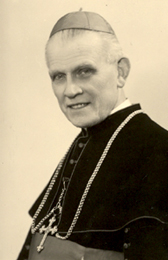Theodor Innitzer
From Kaiserreich
(Republic of the Sicilies renamed Socialist Republic of Italy) |
|||
| (One intermediate revision not shown) | |||
| Line 1: | Line 1: | ||
| - | '''Theodor Innitzer''' (born in Neugeshrei, [[Austria]]-[[Hungary]], on December, 25 1875) is an Austrian cardinal and the current '''Minister of | + | {| align=right style="padding: 5em; background: #f9f9f9; border: 1px #aaaaaa solid; border-collapse: collapse;" |
| + | | http://www.sramission.at/images/innitzer0029.jpg | ||
| + | |} | ||
| + | |||
| + | '''Theodor Innitzer''' (born in Neugeshrei, [[Austria]]-[[Hungary]], on December, 25 1875) is an Austrian cardinal and the current '''Prefect of the Supreme Sacred Congregation of the Holy Office''' and '''Minister of Interior of the [[Italian Federation]]'''. | ||
== Biography == | == Biography == | ||
=== Early Life === | === Early Life === | ||
| Line 8: | Line 12: | ||
From 1913 to 1932 Innitzer was Chair for New Testament Exegesis at the University of Vienna, where he was chosen as Rector in 1928 and 1929. | From 1913 to 1932 Innitzer was Chair for New Testament Exegesis at the University of Vienna, where he was chosen as Rector in 1928 and 1929. | ||
| - | In 1932 he was appointed as Archbishop of Vienna and Pope [[Pius XI]] elevated him to cardinal on March 13 1933. | + | In 1932 he was appointed as Archbishop of Vienna and Pope [[Pius XI]] elevated him to cardinal on March 13 1933. One year later, he was named '''Prefect of the Supreme Sacred Congregation of the Holy Office''', the Holy Office being the successor institution to the Inquisition, making a natural appointed for the position of Minister of Interior. |
| - | Innitzer has recently been criticized by the more liberal cardinals of the Church in Rome because he refused to condemn the rising national-populists [[German_parties#Grossdeutsche_Volkspartei|Greater German People's Party]] and has advocated preventive attacks against Syndicalist countries, rising the tension with the [[Commune of France]] and the [[Republic of | + | Innitzer has recently been criticized by the more liberal cardinals of the Church in Rome because he refused to condemn the rising national-populists [[German_parties#Grossdeutsche_Volkspartei|Greater German People's Party]] and has advocated preventive attacks against Syndicalist countries, rising the tension with the [[Commune of France]] and the [[Socialist Republic of Italy]]. He has also been attacked for supporting the monarchist cause in the [[Italian Federation]], advocating the return of an Habsburg King in the person of [[Josef von Österreich-Toskana]]. |
| - | [[Category:People]] [[Category:Ministers of Security]] [[Category:Italian-related topics]] [[Category:Roman Catholicism]] | + | [[Category:People]] [[Category:Ministers of Security]] [[Category:Austro-Hungarian-related topics]] [[Category:Italian-related topics]] [[Category:Roman Catholicism]] [[Category:National-Populism]] |
Current revision as of 13:26, 25 July 2010

|
Theodor Innitzer (born in Neugeshrei, Austria-Hungary, on December, 25 1875) is an Austrian cardinal and the current Prefect of the Supreme Sacred Congregation of the Holy Office and Minister of Interior of the Italian Federation.
Biography
Early Life
Theodor Innitzer was born in Neugeshrei, a small town in Bohemia, a constituent part of Austria-Hungary, on December 25 1875.
He entered the seminary in 1898 and was ordained priest in 1902. In 1906 he achieved a degree in theology.
Career in the Chuch
From 1913 to 1932 Innitzer was Chair for New Testament Exegesis at the University of Vienna, where he was chosen as Rector in 1928 and 1929.
In 1932 he was appointed as Archbishop of Vienna and Pope Pius XI elevated him to cardinal on March 13 1933. One year later, he was named Prefect of the Supreme Sacred Congregation of the Holy Office, the Holy Office being the successor institution to the Inquisition, making a natural appointed for the position of Minister of Interior.
Innitzer has recently been criticized by the more liberal cardinals of the Church in Rome because he refused to condemn the rising national-populists Greater German People's Party and has advocated preventive attacks against Syndicalist countries, rising the tension with the Commune of France and the Socialist Republic of Italy. He has also been attacked for supporting the monarchist cause in the Italian Federation, advocating the return of an Habsburg King in the person of Josef von Österreich-Toskana.
